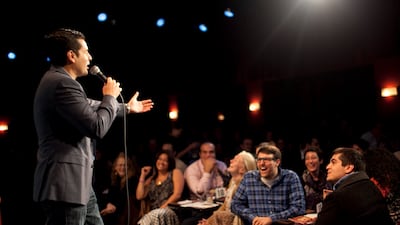For Muslim-American comedians, writing jokes after the September 11 attacks suddenly became deeply personal, as anti-Muslim stereotypes, discrimination and even hate crimes proliferated across the US.
“On September 10, I went to sleep a white guy. On September 11, I woke up an Arab,” recalled Dean Obeidallah, an Arab-American comedian from New Jersey.
He tailored his craft, pivoting from family jokes to gags using a heavy Middle Eastern accent, to help change skewed perceptions and counter the anti-Arab bigotry that was becoming rife in the aftermath of the attacks, when anti-Muslim hate crimes spiked 177 per cent, FBI records show.
“My comedy after 9/11 became more a way of becoming an activist in trying to explain to my fellow Americans more about who Arabs were as opposed to how horribly the media depicted us,” Obeidallah, of Palestinian and Italian descent, told The National.
Maysoon Zayid, who after 9/11 became one of the most renowned Muslim women comics in the US, also remembered her community being “under siege".
“We were labelled terrorists, surveilled by the government and targeted by hate groups,” Zayid said.
Zayid, the daughter of Palestinian immigrants, had grown up in New Jersey and could see the Twin Towers from across the Hudson River.
“Whenever I drove back to Cliffside Park from the Jersey Shore, seeing the towers was my sign that I was almost home,” she recalled.
“Witnessing their destruction was both terrifying and surreal. What followed was even more frightening.”
For Zayid, 47, dark humour and pushing the envelope came easily.
She joined forces with Obeidallah, 51, in 2003 to co-found the New York Arab-American Comedy Festival.
“My jokes didn't change at all post-9/11. I've always been free-styled, I've always been edgy and I always talked about being Palestinian and Muslim.”
In 2006, Zayid opened her one-woman show which was featured in the 2013 documentary The Muslims are Coming!, which features Muslim-American comedians performing stand-up across the southern US.
Asked about lessons she took from the tragedy of 9/11, Zayid pointed to a country coming together in a way it has been unable to replicate during the pandemic.
“The other lesson I hope we all learn is that we shouldn't attack countries that had nothing to do with 9/11, leaving countless civilians dead. That's what I learnt,” she said.
Both Obeidallah and Zayid point to a much more engaged Arab-American community two decades after the attack.
“We have grown a thick skin … We are much more visible in politics, media and the arts,” said Obeidallah, who now hosts The Dean Obeidallah Show on SiriusXM.
But there is no full recovery, Zayid argued.
“I see the Arab community being more organised but I don't know if I can say we're more resilient - the trauma never ended.”
On the West Coast, Maz Jobrani, an Iranian-American comedian whose family moved from Tehran to California when he was six, said discrimination against Muslim Americans far predates 9/11.
“It’s been continuous,” Jobrani said.
The 49-year-old recalled personal episodes of being bullied as a child in northern California schools during the Iran hostage crisis — he was 7 — and during the Iran-Contra Affair in the late 1980s.
“I was talking about those issues throughout. The only thing that might have changed after September 11 was more visibility and more interest in our shows.”
While the attacks did not alter Jobrani’s path of highlighting his Iranian-American experience in his stand-up, he drew some red lines following September 11.
In his memoir, I'm Not a Terrorist, But I've Played One On TV, Jobrani speaks about Hollywood stereotypes and having played the role of a terrorist in a 2002 film with Chuck Norris.
“Now I refuse do this anymore. Agreeing would be only adding to the stereotype that wrongly depicts and hurts the Muslim community,” he told The National in a phone interview.
He did not dismiss recent improvements in Hollywood's portrayal of Muslims, citing as an example the Rami Youssef show Ramy, which follows a Muslim American's day-to-day life in New York.
But as for the general mood, Jobrani doesn’t share Obeidallah’s and Zayid’s optimism of a change in the US public perception of Muslims.
“Look at what's happening now with Afghanistan. We quickly saw people on the right criticise the pullout and then quickly turned around and said, ‘Oh, here they come [the Afghan refugees].’”
He argued that the travel ban targeting Muslim-majority countries under Donald Trump, and the rise in hate crimes against non-Muslim minorities such as Asian Americans during the pandemic exposes a deeper problem.
“I would argue that it hasn't got any better. We Americans don't learn from history. Unfortunately we repeat it,” he said.
Still, the power of comedy and seeing Muslim comedians can go a long way in breaking stereotypes, Jobrani said.
Even at the basic level of showing that Muslim comedians and artists laugh, it breaks the angry stereotype by showing “they actually have a sense of humour".


